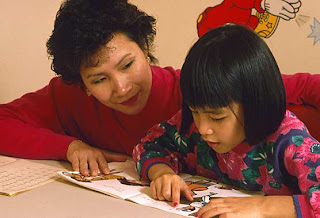 |
| (castlemaineindependent.org) |
Why discuss parenting types? Sometimes parents, especially new parents who are having their first child, have no or little idea about the impact of parenting styles. Types of parenting influences the types of attachment the children will have to their parents and contributes to their development. Moreover, these types of parenting are used to capture normal variations in parents' attempts to control and socialize their children.
 |
| (bebemagico.com) |
Diana Baumrind's Parenting Styles
During the early 1960s, psychologist Diana Baumrind conducted a study on more than 100 preschool-age children by using naturalistic observation, parental interviews and other research methods. According to Baumrind, the parenting styles are based on responsiveness and demandingness (Shaffer,2009).
Responsiveness is described as the amount of warmth and affection parents display, while demandingness is based on how strict or structured a caregiver makes the environment. Based on those dimensions, Baumrind came up with three types of parenting styles defined in terms of their responsiveness and demandingness, with the addition of another study by Maccoby and Martin that discovered the fourth type:
- Authoritative: high in demandingness and responsiveness
- Indulgent: low in demandingness, high in responsiveness
- Authoritarian: high in demandingness, low in responsiveness
- Indifferent: low in demandingness and responsiveness
Baumrind suggests that these parents "monitor and impart clear standards for their children’s conduct. They are assertive, but not intrusive and restrictive. Their disciplinary methods are supportive, rather than punitive. They want their children to be assertive as well as socially responsible, and self-regulated as well as cooperative" (1991).
 |
| (fsc.yorku.ca) |
An authoritative parent wants to raise a child who can be self-reliant and feel secure and comfortable with interpersonal relationships. Authoritative parents establish rules and guidelines that their children are expected to follow. When the children fail to meet the expectations, this type of parent will be more likely to nurture and forgive. The parents are high in responsiveness and willing to explain and listen to questions. Authoritative parents enable interactions between themselves and their children.
Children qualities:
- Lively and happy
- Self-confident
- Able to regulate emotions
- Problem solvers
- High social skills
Indulgent/Permissive Parents - The "Friend"
According to Baumrind, permissive parents "are more responsive than they are demanding. They are nontraditional and lenient, do not require mature behavior, allow considerable self-regulation, and avoid confrontation" (1991).
 |
| (enoughisenoughau.blogspot.com) |
The indulgent parent's perspective is that discipline is an infringement on the teen’s freedom; his high responsive is to be a resource to his child. Permissive parents have two different approaches: the passive - non directive approach and active - democratic approach.
The passive - non directive approach is where the parents are available to their children but they are not assertive. While the other approach, the active - democratic is when parents always checking on their kids to ensure that their needs are met.
Permissive parents rarely discipline their children because they have relatively low expectations of maturity and self-control. They have very few demands on their kids, but are high in responsiveness. When the kids actually cross the line, they are punished by love withdrawal. The parents will give a threat of or an actual temporary removal of warmth and support with a goal of changing unwanted behaviors.
Children qualities: "..children who rank low in happiness and self-regulation. These children are more likely to experience problems with authority and tend to perform poorly in school"
- Poor emotional regulation
- rebellious and defiant when desires are challenged
- Low persistence to challenging tasks
- Antisocial (whiny, demanding, narcissist)
Authoritarian Parents - The Drill Sergeant
According to Baumrind, authoritarian parents "are obedience- and status-oriented, and expect their orders to be obeyed without explanation" (1991).
 |
| (sheknows.com) |
Parent's perspective is to emphasize control because teen is not to be trusted and requires structure, order, and obedience on everything. These parents practice "Power Assertion" - a demonstration by the parent to assert their dominance over the adolescent. And when their kids violate their rules, the parents may take the form of verbal, psychological, or physical abuse.
Authoritarian parents fail to explain the reasoning behind their rules; they simply state "Because I said so" when their children question them. These parents have high demand and have strict rules, but they are low in responsiveness.
Child qualities: "...children who are obedient and proficient, but they rank lower in happiness, social competence and self-esteem"
- Anxious, withdrawn, and unhappy
- Poor reactions to frustration
- Not likely to engage in antisocial activities
Indifferent Parents - The Neglectful Parents
The indifferent parent tends to view the teen as a burden and hindrance to his own goals and needs. There are two subtypes of this type of parenting: Neglecting - passive form of indifference and Rejecting - neglecting: active form of indifference (actively push adolescent away).
Indifferent parents do fulfill the child's basic needs, but they are generally detached from their child's life. They have low demandingness and responsiveness; in general, they have little interaction and communication with their kids.
The children of indifferent parents don’t handle independence very well, similar to the indulgent style, but for different reasons. They tend to lack self-control, have low self-esteem and are less competent than their peers (due to the absence of guidance or a coping mechanism). They might develop behavioral and psychological dysfunction.
We hope that this helps parents better understand the appropriate ways to interact with their children.
References:
Crosby, B. (2010, September 30). Lecture on Attachment presented in Psychology 414. The Pennsylvania State University, University Park, PA.
Hunt, Cathleen. (Spring 2009). Lecture on Attachment presented in Psychology 212. The Pennsylvania State University, University Park, PA.
Shaffer, D. R. (2009). Social and Personality Development (6th Ed.). Belmont, CA: Wadsworth, Cengage Learning.
Best regards,
ChildWorksGuru

No comments:
Post a Comment